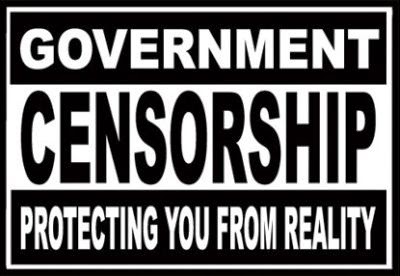Copyright Law as a Tool for State Censorship of the Internet

When state officials seek to censor online speech, they’re going to use the quickest and easiest method available. For many, copyright takedown notices do the trick. After years of lobbying and increasing pressure from content industries on policymakers and tech companies, sending copyright notices to take media offline is easier than ever.
The copyright law that state actors most often invoke is the Digital Millennium Copyright Act(DMCA). The DMCA was the first major digital copyright law passed in the United States, creating strict procedural rules for how and when a copyright holder can claim that uploaded content infringes on their copyright. US-based tech companies that receive these infringement notices must comply with these rules to receive their safe harbor—the protection they have from being liable for hosting unlawful user content.
The DMCA has become a global tool for censorship, precisely because it was designed to facilitate the removal of online media. The law carries provisions on intermediary liability, among many other strict copyright enforcement rules, which induce websites, Internet service providers, and other such “intermediaries” to remove content that is alleged to be a copyright infringement.
If the DMCA is US law, how can governments around the world use it to censor speech? The DMCA has become the default template for tech companies to respond to copyright infringement notices. Since many major tech companies have offices in the US, they must comply with US law. But even if they don’t operate in this jurisdiction, most major companies have implemented a DMCA-style takedown procedure anyway because it has become a de facto legal norm.
It’s a norm that is reinforced and exported abroad by dozens of trade agreements that carry provisions that mirror, and further entrench, restrictive interpretations of the DMCA. The South Korea-US free trade agreement (aka KORUS) and the Australia-US free trade agreement (aka AUSFTA) are just two examples. The language in those agreements were actually a lot like the DMCA. But the negotiators abstracted the language just enough so that US law could still be compliant with it, while the other countries could be pressured to enact even harsher domestic restrictions. Following their trade agreements with the US, South Korea enacted a three-strikes takedown regime, and Australia was pushed into enacting policies requiring intermediaries to terminate the accounts of repeat infringers. The Trans-Pacific Partnership (TPP) and the Trans-Atlantic Trade and Investment Partnership (TTIP) are two multilateral trade agreements that may contain similarly expansive copyright terms.
Now we’re seeing a disturbing trend where governments and state-friendly agencies are abusing DMCA takedowns to silence political criticism. Here are the cases we know about where governments have misused US copyright law to censor the Internet.
DMCA and State Censorship Around the World: A Timeline of Case Studies
- UNITED STATES: YouTube removed a 30-second Air Force recruitment ad after lawyers for the Air Force’s Cyber Command sent a DMCA notice demanding it take it down. The notice was likely invalid, since US government works are in the public domain. (March 2008)
- CANADA: The House of Commons sent takedown notices to Friends of Canadian Broadcasting for posting videos and podcasts of Parliamentary committee proceedings on their website. (May 2009)
- CANADA: The Auditor General issued a takedown to both The Globe and Mail and Scribd, for posting one section of the Auditor General’s report on immigration, claiming that crown copyright applies. (November 2009)
- CANADA: Transport Canada issued a takedown notice to Scribd over an on-the-record response to a journalist. (February 2012)
- CANADA: Department of National Defense demanded the removal of a widely discussed leaked copy of the Canadian Land Force Counter-Insurgency Operations Manual from the site PublicIntelligence.net. It is unknown if other websites that published the document received similar notices. (April 2012)
- UNITED STATES: The Department of Homeland Security reportedly issued copyright takedowns to YouTube over some conspiracy theory videos, when federal agencies themselves cannot own copyrights—unless it has been assigned to them, which seems unlikely in this case. (August 2012)
- ECUADOR: A law firm, Ares Rights, has been sending DMCA takedown notices to dozens of websites, companies and individuals over tweets, documentaries, and search results on behalf several Ecuadorian state officials. (2014 and ongoing)
- SAUDI ARABIA: A satirical show on Youtube called “Fitnah” was censored when the primary, state-funded Saudi TV channel, Rotana, sent DCMA notices to take down several of their videos. Later, a Lebanese TV show did a report about the takedown, and then another DMCA notice was sent and it was also removed from Youtube. All of the videos were later restored. (September 2014)
- BRAZIL: Videos critical of 2014 presidential candidate and former governor, Aécio Neves, have been targeted by copyright takedowns. Although the identity of the sender cannot be confirmed, there is much speculation that Neves himself is behind the takedowns. (October 2014)
There are likely many more notices that state actors have used to censor users. Rightsholders are sending more and more DMCA takedowns by the year, and a telling sign of this is that some companies have begun to quantify this abuse in their transparency reports. As companies are increasingly being forced to be complicit in this censorship, it’s now more important as ever for them to be transparent about the notices they receive, and for them totake advantage of the flexibility they have under the DMCA to do what they can to protect users’ speech.
If you know of any cases of state-mandated Internet censorship carried out through the DMCA or other copyright laws’ takedown procedures, please send them to [email protected]. We already track general DMCA takedowns with our Takedown Hall of Shame. Now we’re looking for more cases where governments and their agencies have directly sought to censor the Internet via their own takedown requests.

